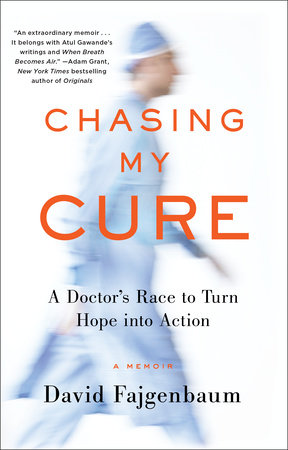Excerpt
Chasing My Cure
INTRODUCTION
After you’ve mastered the basics of technique—hand placement, head tilt, and timing—and after you’ve accepted the inevitable feeling of shattering ribs beneath the heels of your hands, the hardest thing about performing CPR is knowing when to stop.
What if one more pump could do it?
Or one more after that?
When—no matter how hard you push, how hard you hope and pray—that pulse just will not return, then what comes next is entirely up to you. The life has already been lost. But hope hasn’t been, not necessarily. You could keep that alive at least. You could keep doing compressions until your arms and shoulders are too worn out to continue, until you can’t push hard enough to make a difference, much less break another rib.
So—how long do you try to bring someone back?
Eventually you will remove your hands from the body, eventually you’ll have to—but
eventually isn’t a number. It isn’t guidance. You won’t see it in a CPR diagram. And it doesn’t even really answer “when” so much as “why.” When you
eventually stop, you stop because there’s no more hope. That’s what makes the decision so difficult. Your effort allows you to hope that life is possible, and your hope inspires you to push even harder. The three of those things—hope, life, and effort—chase one another, keep one another moving around a track.
I have performed CPR twice in my life. Both times, the patients were nearly dead when I began my relentless chest compressions and prayers. And both ended up dying. I didn’t want to stop. I wish I was still going right now. And I continued to hope that I’d see a pulse appear on the heart monitor even after I had stopped my chest compressions. But hoping and wishing are often not enough. Hope can be a force; but it isn’t a superpower. Neither is any part of medicine, much as we’d like it to be.
It can feel like one, though.
When I set out to be a doctor, I had already borne witness to incurable disease and inconsolable sadness—my mother had died of brain cancer when I was in college—but I was still optimistic about the power of science and medicine to find answers and cures. Because to be honest, long after I could reasonably blame it on youth and naïveté, I basically believed in the Santa Claus theory of civilization: that for every problem in the world, there are surely people working diligently—in workshops near and far, with powers both practical and magical—to solve it. Or perhaps they’ve already solved it.
That faith has perverse effects, especially in medicine. Believing that nearly all medical questions are already answered means that all you need to do is find a doctor who knows the answers. And as long as Santa-doctors are working diligently on those diseases for which there are not yet answers, there is no incentive for us to try to push forward progress for these diseases when they affect us or our loved ones.
I know better now. I’ve had a lot of time over the past few years to think about doctors, and they’ve had a lot of time to think about me. One thing I’ve learned is that every one of us who puts on a white coat has a fraught relationship with the concept of
authority. Of course, we all train and grind for years and years to
have it. We all
want it. And we all seek to be the trusted voice in the room when someone else is full of urgent questions. And the public expects near omniscience from physicians. But at the same time, all of that education, all those books, all those clinical rotations, all of it instills in us a kind of realism about what is and what is not ultimately possible. Not one of us knows all there is to know. Not even nearly. We may perform masterfully from time to time—and a select few may really be masterful at particular specialties—but by and large we accept our limits. It’s not easy. Because beyond those limits are mirages of omnipotence that torture us: a life we could have saved, a cure we could have found. A drug. A diagnosis. A firm answer.
The truth is that no one knows everything, but that’s not really the problem. The problem is that, for some things, no one knows
anything,
nothing is being done to change that, and sometimes medicine can be frankly wrong.
I still believe in the power of science and medicine. And I still believe in the importance of hard work and kindness. And I am still hopeful. And I still pray. But my adventures as both a doctor and a patient have taught me volumes about the often unfair disconnect between the best that science can offer and our fragile longevity, between thoughts and prayers and health and well-being.
This is a story about how I found out that Santa’s proxies in medicine didn’t exist, they weren’t working on my gift, and they wouldn’t be delivering me a cure. It’s also a story about how I came to understand that hope cannot be a passive concept. It’s a choice and a force; hoping for something takes more than casting out a wish to the universe and waiting for it to occur. Hope should inspire action. And when it does inspire action in medicine and science, that hope can become a reality, beyond your wildest dreams.
In essence, this is a story about dying, from which I hope you can learn about living.




